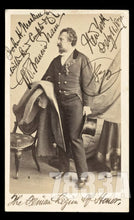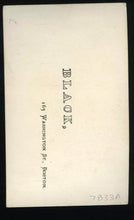Original CDV of George Francis Train (March 24, 1829 – January 18, 1904), AKA "Citizen Train", an American businessman who organized the clipper ship line that sailed around Cape Horn to San Francisco; he also organized the Union Pacific Railroad and the Credit Mobilier in the United States in 1864 to construct the eastern portion of the Transcontinental Railroad, and a horse tramway company in England while there during the American Civil War.
Boldly signed and dated, New York, 1872, with "The Fenian Legion of Honor" written in the margin below. The back has J.W. Black's Boston imprint. CDV is 4" x 2.5" and in VG or better antique condition.
Continued, from Wiki: In 1868 Train was arrested while aboard the RMS Scotia in the port of Queenstown (now Cobh) in Ireland,[10] and held in custody. He had in his possession speeches he had given in the United States in defense of the Fenian cause of Irish independence. These documents were seized by a local magistrate. His release four days later was on condition that he disavow any intention of promoting Fenianism while in Ireland or England.
In 1872, the year this was signed, Train ran for president of the United States as an independent candidate.
GEORGE FRANCIS TRAIN was a fascinating man. He was born in Boston and orphaned at age 4 after his family died of yellow fever in New Orleans. At an early age he became a successful merchant and shipping magnate, opening his own business in Australia. He helped finance clipper ships to California in 1849 and introduced street railways at London and other European capitals. He referred to himself as "Citizen Train." He was also the confidante of French and Australian revolutionaries (and had been offered the presidency of a proposed Australian republic, but declined). Among his many creative ideas that were successfully put into commercial use were rubber erasers on the ends of pencils, perforating sheets of postage stamps to make tearing easier. He also secured a charter from the U.S. Congress to build what became the Union Pacific Railroad, and organized its financing by means of an ingenious scheme he had heard about in France-the Crédit Mobilier. He ran for President in 1872 as an independent candidate. During his candidacy he made 1,000 speeches (and charged admission-collecting a total of $90,000 during the campaign) and spoke to over 2,000,000 people. Grant won the election. Horace Greeley came in second followed by three other candidates. Train came in last-- he received no votes. Train was the inspiration for Phileas Fogg in Jules Verne's "Around the World in 80 Days." Verne had read of Train's real life account of going around the world in 80 days. Train supported the temperance movement, and was jailed on obscenity charges while defending Victoria Woodhull, the first woman candidate for U.S. President. Later in life he became more eccentric. He spent his final days on benches in New York's Central Park handing out dimes and refusing to speak to anyone but children and animals.
Boxed shipping.



